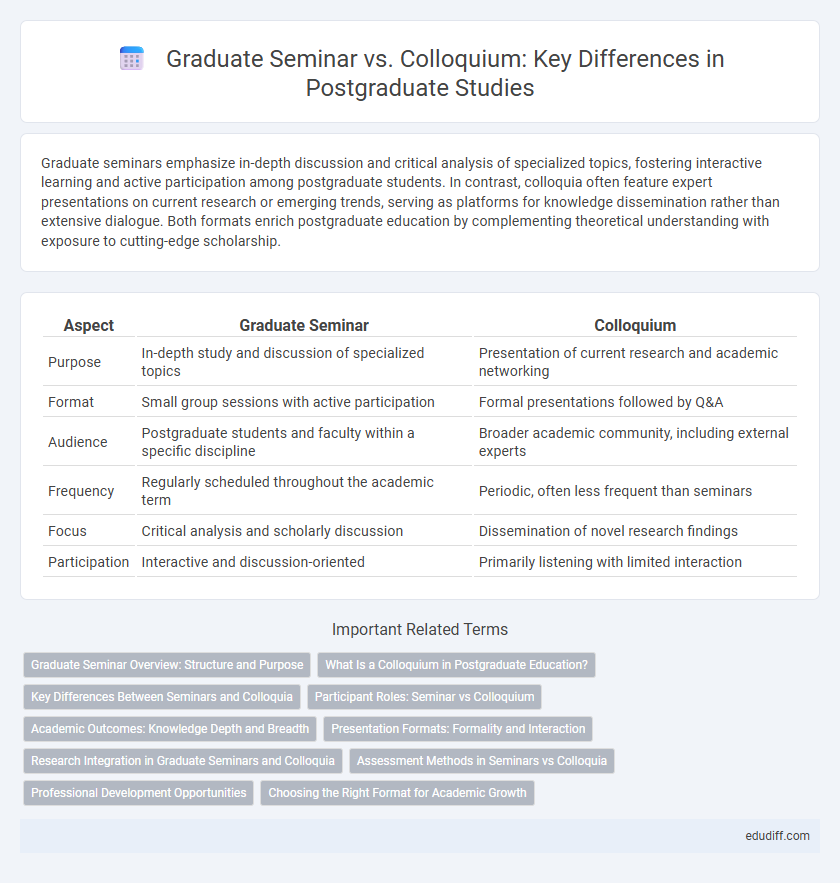Graduate seminars emphasize in-depth discussion and critical analysis of specialized topics, fostering interactive learning and active participation among postgraduate students. In contrast, colloquia often feature expert presentations on current research or emerging trends, serving as platforms for knowledge dissemination rather than extensive dialogue. Both formats enrich postgraduate education by complementing theoretical understanding with exposure to cutting-edge scholarship.
Table of Comparison
| Aspect | Graduate Seminar | Colloquium |
|---|---|---|
| Purpose | In-depth study and discussion of specialized topics | Presentation of current research and academic networking |
| Format | Small group sessions with active participation | Formal presentations followed by Q&A |
| Audience | Postgraduate students and faculty within a specific discipline | Broader academic community, including external experts |
| Frequency | Regularly scheduled throughout the academic term | Periodic, often less frequent than seminars |
| Focus | Critical analysis and scholarly discussion | Dissemination of novel research findings |
| Participation | Interactive and discussion-oriented | Primarily listening with limited interaction |
Graduate Seminar Overview: Structure and Purpose
Graduate seminars are structured, discussion-based courses designed to deepen students' understanding of specialized topics through critical analysis and collaborative learning. These seminars often require students to present research findings, engage in peer feedback, and critically evaluate scholarly articles to develop advanced academic skills. The primary purpose is to foster intellectual growth, enhance research capabilities, and prepare students for professional or academic careers in their field.
What Is a Colloquium in Postgraduate Education?
A colloquium in postgraduate education is an academic meeting where students and faculty present and discuss research topics, fostering collaborative learning and critical thinking. Unlike a graduate seminar, which typically involves structured coursework and guided discussions, a colloquium emphasizes open dialogue and the exchange of innovative ideas across disciplines. This format enhances scholarly communication, networking opportunities, and the development of presentation skills essential for advanced academic and professional careers.
Key Differences Between Seminars and Colloquia
Graduate seminars emphasize interactive student participation and in-depth discussion on specialized research topics, fostering critical analysis and knowledge application. Colloquia typically feature expert guest speakers presenting current research to a broader academic audience, prioritizing information dissemination over interactive engagement. Seminars often require student presentations and continuous dialogue, while colloquia focus on formal lectures with limited audience interaction.
Participant Roles: Seminar vs Colloquium
Graduate seminar participants typically engage in structured discussions, presenting research findings and critically analyzing academic literature under faculty guidance. Colloquium attendees often include a broader academic audience, where speakers present on specialized topics followed by open question-and-answer sessions to encourage scholarly debate. Seminar roles emphasize active, ongoing dialogue among peers, while colloquium roles highlight knowledge dissemination and interdisciplinary exchange.
Academic Outcomes: Knowledge Depth and Breadth
Graduate seminars emphasize in-depth exploration of specialized topics, fostering critical thinking and detailed research skills. Colloquia provide broader academic engagement by facilitating interdisciplinary dialogue and exposure to diverse research methodologies. Together, these formats enhance comprehensive knowledge acquisition and intellectual versatility for postgraduate students.
Presentation Formats: Formality and Interaction
Graduate seminars typically feature formal presentations with structured formats, requiring students to prepare in-depth analyses supported by extensive research. Colloquia emphasize interactive dialogue, encouraging spontaneous discussion and collaborative exploration of topics among participants. This distinction influences the level of formality and audience engagement, shaping the communication style and depth of presentation in postgraduate education.
Research Integration in Graduate Seminars and Colloquia
Graduate seminars and colloquia both serve as platforms for advanced scholarly discourse, yet graduate seminars emphasize in-depth research integration through structured presentations and critical discussions. Colloquia typically foster broader intellectual exchange, featuring diverse topics and guest speakers that stimulate interdisciplinary insights. Effective research integration in graduate seminars involves critical analysis and synthesis of current studies, enhancing comprehensive understanding and advancing specialized academic expertise.
Assessment Methods in Seminars vs Colloquia
Graduate seminar assessment methods primarily involve active participation, critical presentations, and in-depth research papers that showcase individual analytical skills. Colloquium evaluations emphasize oral presentations and peer feedback, highlighting real-time knowledge exchange and collaborative discussion. Both formats assess comprehension, but seminars prioritize written analysis while colloquia focus on verbal articulation and engagement.
Professional Development Opportunities
Graduate seminars foster professional development through in-depth discussions, critical analysis, and peer feedback, enhancing research and presentation skills vital for academic careers. Colloquia offer exposure to diverse research topics and networking opportunities with experts, broadening scholarly perspectives and potential collaborations. Both formats contribute uniquely to postgraduate professional growth by developing communication abilities and expanding academic networks.
Choosing the Right Format for Academic Growth
Graduate seminars offer in-depth exploration of specialized topics through student-led discussions and faculty mentorship, fostering critical thinking and research skills essential for academic growth. Colloquia, often featuring guest speakers or interdisciplinary presentations, provide exposure to diverse perspectives and emerging research trends, enhancing networking opportunities and broadening scholarly horizons. Selecting the right format depends on one's learning objectives: seminars promote deep engagement and skill development, while colloquia encourage intellectual diversity and professional connections.
Graduate Seminar vs Colloquium Infographic

 edudiff.com
edudiff.com